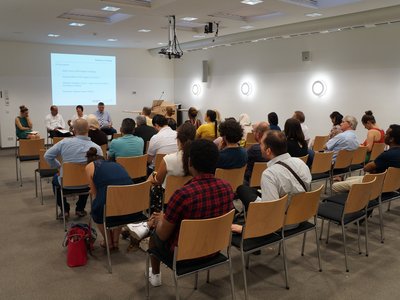

Maiada Hadaia (OeAD) talked with the panelists about the situation in Austria and possible solutions for the common problems faced by refugee researchers, including the possibility of being forced to find lower skilled employment and forego the chance to rejoin the respective scientific field. Her discussion partners were Awab Younus, a PhD in Biology from Iraq with over 20 years of work experience, Hamdi Alsaffouri, a PhD in Genetics from Syria with 10 years of work experience, and Katharine Sarikakis, a professor from the University of Vienna and project leader of the Open Learning Initiative OLIve (a project aiming to connect refugees and asylum seekers with their previous professional and academic experience).
The film Science in Exile (2017) explores how recent violence in Syria, Yemen and Iraq has threatened the lives of four researchers, forcing them to suspend their work and flee their homelands. It finds women and men with years of training and experience who are struggling to find a place in new lands – a safe place where they can continue their research and make a scientific contribution, challenging common stereotypes of refugees from war-ravaged regions. This is a situation that uncounted thousands of their colleagues face globally – scientists, engineers, doctors and medical researchers, advanced science students. If you are interested in hosting a screening yourself, please contact scienceinexile@twas.org
Current OeAD projects with a focus on refugee researchers:
EURAXESS TOP IV Task 3.4 “Refugee initiatives”: Focus on services for refugee researchers who are looking for access to the European labour market. www.euraxess.at
BRiDGE II – Bridge for Researchers in Danger Going to Europe Step II: An all-in-one solution for the localized guidance of refugee researchers in the European Research Area. www.uni-bielefeld.de/International/projects/bridges.html
oead4refugees – Information about higher education for refugees in Austria
